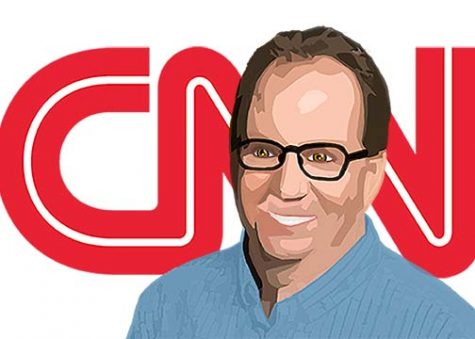‘Take risks and learn how to fail’: John Davies inspires the next generation of journalists
October 18, 2021

Question everything. Trust no one. Learn how to fail.
After working to keep an international cable news network on-air and functioning during a pandemic when all of its anchors were at home, a Columbia alum found time to offer students insight and advice in a recent campus visit.
John Davies, international vice president of Technical Operations at CNN and a Columbia College Chicago alum, met with Columbia students on Thursday, Oct. 14 in a lecture hall in the 33 E. Ida B. Wells building.
In his presentation, which was held in a hybrid format, as he talked to students with him in the room as well as students on Zoom, Davies gave advice to the next generation of journalists and discussed his career in the industry.
“Question everything, trust no one and listen and learn from everyone. It’s a big deal. … I also say do all jobs … never deny any type of experience,” said Davies. “Take risks and learn how to fail. … If you don’t screw up, you’re not doing anything.”
Davies, who graduated from Columbia in 1988, started working for CNN as a video journalist two weeks after earning his degree in broadcast journalism. Since then, Davies has climbed the ladder at CNN, moving from video journalism to work as an audio operator and training to become one of CNN’s technical directors, before taking on the role of vice president of Technical Operations.
In addition to sharing his experience at Columbia and giving advice on how to navigate the journalism industry, Davies also gave students a glimpse into what it has been like to keep CNN broadcasting live during COVID-19.
“[I wanted to] give students an insight of what doing live TV production is like during COVID,” Davies said. “It’s not just a CNN thing, all the broadcasters had to do this, … but it’s the challenges behind the scenes that it took. … March 2020, when this was happening — what did we have to do to adjust?”
Davies said CNN sent their anchors home early in the pandemic and spent about $250,000 per home setup in order for anchors to broadcast from their homes. Davies also said generally just one production manager or technical producer was allowed in each anchor’s home because of social distancing measures, which resulted in nearly all of the production crew broadcasting remotely.
Erin McCarthy, interim chair of the Communication Department and associate professor of history in the Humanities, History and Social Sciences Department, said Columbia, as an institution, is grateful for alumni like Davies who come back and speak to students.
“I think we’ve seen the connection between the alumni and the institution grow and grow and grow in the recent years,” McCarthy said. “For someone [like Davies] to come during this time and want to give back … we’re really grateful. We all have things to learn.”
Dirk Matthews, senior director of Alumni Relations at Columbia, has been working to bring Davies back to campus to share his story with students for more than a year.
“I heard [Davies’] story and was particularly intrigued by his process — not only his career — but [I] also thought it was unique how he approached doing his work during the pandemic,” Matthews said. “We have been talking for probably almost a year about having him come and talk to students, and this just happened to be the perfect time for him to be in Chicago and to have him speak to students.”
Davies was able to inspire students firsthand with his career story. Francia Garcia Hernadez, a graduate student in the civic media program, said she walked away from the presentation with a new view on networking in the journalism field.
“I think Columbia does a really good job with bringing [to campus] alumni and people we can meet and work with for inspiration,” Garcia Hernandez said. “It makes it feel like it is actually possible for you to have these big names [in media] and reach them, rather than being on your computer trying to apply for a job. As students, we get a lot of benefits out of that.”
In addition to his work at CNN, Davies discussed how Columbia helped ingrain a strong work ethic within him and how the school still influences him to this day.
“I never had a teacher [at Columbia] who didn’t just love what they did,” Davies said. “The teachers and the professors are the backbones of Columbia because they’re in the industry. It’s hard to put a finger on something like that because it’s just ingrained in everything I’ve ever felt about Columbia. I’m just super impressed with the school. ‘Columbia proud’ is something I think that every student could say, as they were proud to have gone to the school.”







